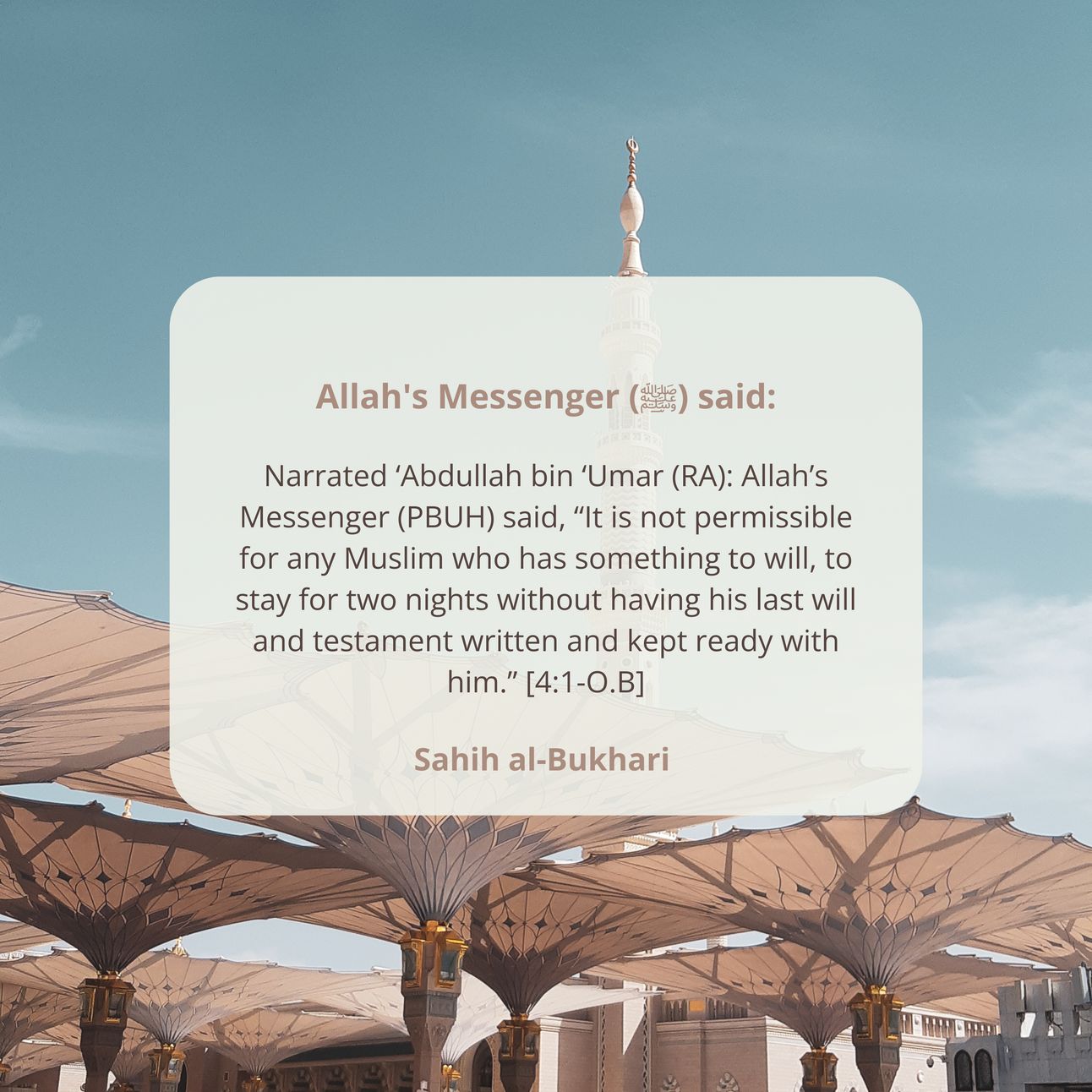- Halal Legacy Shield
- Posts
- The Importance of Including International Assets in Your Islamic Will
The Importance of Including International Assets in Your Islamic Will
As-Salaam-Alaikum, Esteemed Readers,
We trust this message reaches you in vibrant health and elevated Imaan, filled with positivity and purpose.
Welcome to this week's edition of the Halal Legacy Shield newsletter. Today, we explore a topic of increasing relevance in our globalized world: Navigating International Assets in Islamic Wills. As Muslims with assets spread across continents, it is crucial to ensure that our financial legacies are managed in accordance with Islamic principles.
Why It Matters
Islamic wills are essential for ensuring that your assets are distributed according to Shariah law. However, when these assets are international, complexities arise that need careful consideration. From diverse legal frameworks to varying tax implications, international assets require a strategic approach to safeguard your legacy.
TODAY’S EMAIL
The Importance of Including International Assets in Your Islamic Will
The Importance of a Sharia-Compliant Will
Asset Protection for Business Owners (Strategy)
Facts about Islam a common Misblief

In today’s globalized world, many of us have investments, properties, or other assets scattered across different countries. Whether it's real estate in the Middle East, a business venture in Southeast Asia, or a bank account in Europe, these international assets add a layer of complexity to estate planning. It's essential to ensure that all assets, regardless of where they are located, are distributed according to Islamic principles and local laws.
Incorporating international assets into an Islamic will is not just about legal compliance—it's about fulfilling our religious duty to manage and distribute our wealth justly, safeguarding our families and our legacies. Let's explore why it’s crucial to address international assets in your Islamic Will and how you can do so effectively.
What Qualifies as International Assets?
First, let’s define what we mean by international assets. Simply put, international assets refer to any type of asset you own outside of your home country. These can include:
Real Estate: Properties such as homes, commercial buildings, or land.
Financial Accounts: Bank accounts, investment accounts, or pension funds held in foreign banks or financial institutions.
Business Interests: Ownership stakes in foreign companies, partnerships, or joint ventures.
Personal Belongings: Valuable items like jewelry, artwork, or vehicles located abroad.
Intellectual Property: Patents, trademarks, or copyrights registered in foreign jurisdictions.
Understanding the nature of these assets is the first step in ensuring they are properly accounted for in your Islamic Will.
Tax Implications and Legal Considerations
When drafting an Islamic will that includes international assets, there are several tax implications and legal considerations to keep in mind:
Double Taxation: One of the biggest challenges is the potential for double taxation—once in the country where the asset is located and again in your home country. Some countries have treaties to avoid double taxation, but not all do. It’s crucial to understand these treaties' specifics and work with a tax advisor to minimize your liabilities.
Shariah Compliance vs. Local Laws: Different countries have varying laws on inheritance and estate distribution. While your will must comply with Shariah principles, it must also align with the legal requirements of each country where your assets are held. For instance, some jurisdictions may have mandatory heirship rules that conflict with Islamic guidelines.
Currency and Valuation Issues: The valuation of assets in different currencies can fluctuate due to exchange rates. It’s important to periodically review and update your will to ensure that asset values are accurately reflected in your distribution plan.
Legal Documentation and Proof of Ownership: Ensuring that you have all the necessary legal documentation to prove ownership of international assets is crucial. This may involve obtaining translations, apostilles, or additional legal certifications.
Executor Challenges: The executor of your will needs to have the capability to manage and distribute international assets effectively. This might mean appointing multiple executors or a professional executor with experience in international estate management.
Call to Action: Protect Your International Assets Today
Navigating international assets in Islamic wills may seem daunting, but you don't have to do it alone. At Islamic Wills Trust Services, we specialize in helping our clients protect their legacies in full compliance with both Islamic principles and international laws.
Ready to start planning your Islamic will with confidence? Contact us today for a free consultation with one of our expert advisors. Let us help you create a comprehensive estate plan that ensures your assets are distributed according to your wishes and values, no matter where in the world they are.
Schedule your free consultation now! Click here to book your appointment

Writing a will is a crucial aspect of planning for the future, but for Muslims, it's not just about distributing wealth—it's about fulfilling an Islamic obligation. A Sharia-compliant will ensure that your assets are distributed according to Islamic law, protecting your loved ones and your legacy in a manner that aligns with your faith.
In this newsletter, we’ll explore the key elements that make a will compliant with Sharia, the legal requirements, and the considerations you should keep in mind when drafting your will. We’ll also share real-life examples of issues that have arisen from non-compliant wills and provide practical tips to help you avoid these pitfalls.
What Makes a Will Sharia-Compliant?
To start, let's clarify what it means for a will to be Sharia-compliant. A Sharia-compliant will adhere to Islamic inheritance laws as laid out in the Quran and Sunnah. Here are the essential components that must be included:
Adherence to Fixed Shares: In Islam, specific relatives are entitled to fixed shares of an estate. For example, a wife typically receives one-eighth if the deceased has children, and one-fourth if there are no children. Sons and daughters inherit in a ratio of 2:1, respectively. It's crucial to follow these fixed shares when drafting your will.
Recognition of Legal Heirs: Islamic law recognizes specific heirs, such as spouses, children, parents, and siblings. It’s important to list all potential heirs in your will and ensure that they receive their rightful shares.
Bequests and Legacies: Muslims are allowed to make a bequest (Wasiyyah) of up to one-third of their estate to non-heirs, such as friends, distant relatives, or charitable organizations. However, this bequest cannot exceed one-third of the total estate value and must not infringe on the rights of the legal heirs.
Debt Repayment: Before any distribution of the estate, all debts must be settled. This includes outstanding loans, zakat, unpaid mahr (dowry), and any other financial obligations. Ensuring these debts are paid is an essential aspect of a Sharia-compliant will.
Executor Appointment: It is important to appoint a trustworthy executor who understands both Sharia principles and the legal requirements in your country of residence. This person will be responsible for ensuring that your wishes are carried out in accordance with Islamic law.
Legal Requirements and Inheritance Laws
When drafting a Sharia-compliant will, there are additional legal considerations to keep in mind:
Understanding Local Laws: While it's essential to follow Islamic inheritance laws, your will must also comply with the laws of the country where you reside. In some jurisdictions, Islamic wills may not be fully recognized, or there may be specific requirements for wills to be legally binding. Working with a knowledgeable professional who understands both Islamic and local legal requirements is crucial.
Avoiding Conflicts: A common issue arises when a will is Sharia-compliant but conflicts with local inheritance laws. This can lead to legal disputes and delays in asset distribution. It’s important to draft your will in a way that minimizes potential conflicts, such as specifying that the will should be interpreted according to Islamic law to the extent allowed by local law.
Updating Your Will: Life circumstances change, and so should your will. Regularly reviewing and updating your will ensures that it remains compliant with both Islamic law and any changes in local legislation.
At Islamic Wills Trust Services, we specialize in helping Muslims create Sharia-compliant wills that align with both Islamic principles and local laws. Our team of experts includes Islamic scholars and legal professionals who work together to provide comprehensive guidance tailored to your unique situation.
We offer services such as:
Personalized Will Drafting: We help you create a will that meets all Sharia requirements and adheres to local legal standards.
Estate Planning Consultation: Our experts provide guidance on how to structure your estate to avoid disputes and ensure smooth distribution.
Regular Will Reviews and Updates: We offer ongoing support to keep your will up-to-date with any changes in your life or the law.
Call to Action: Secure Your Legacy Today
Ensuring your will is Sharia-compliant is not just about fulfilling a legal requirement; it’s about fulfilling a religious duty and protecting your loved ones' future. Don’t leave this important task to chance. Reach out to us today for a free consultation to discuss how we can help you create a will that truly reflects your values and meets all Islamic and legal requirements.
Ready to get started? Click here to schedule your free consultation.

What is Asset Protection and Why is it Crucial for Small Businesses?
For business owners!
Running a small business comes with its fair share of risks and challenges. From lawsuits to unexpected financial setbacks, many potential threats could impact your business’s stability and growth. This is why asset protection is such a vital part of any small business strategy.
Asset protection refers to a range of strategies designed to safeguard a business’s valuable resources—such as cash, property, intellectual property, and even personal assets—from potential risks and claims. For small businesses, having an asset protection plan in place is crucial. Unlike large corporations with extensive legal teams and financial buffers, small businesses are often more vulnerable to financial shocks and legal challenges. Without proper protection, these businesses could find themselves facing significant losses that could threaten their survival.
Effective asset protection can help shield your business from lawsuits, creditors, bankruptcy proceedings, divorce settlements, and other financial risks, ensuring that your hard-earned assets remain secure and your business can continue to thrive.
Key Strategies for Asset Protection
Here are some of the most effective strategies for protecting your small business assets:
Assignment of Interest to a Living Trust:
What Is It?: This involves transferring ownership of your business interests (such as shares in a corporation or membership interests in an LLC) to a living trust. The trust then becomes the legal owner of these interests.
Benefits:
Avoids Probate: Upon your death, the assets in a living trust bypass the probate process, which can be lengthy and costly. This ensures a smooth transition of your business interests to your heirs or chosen beneficiaries.
Maintains Privacy: Unlike probate, which is a public process, transferring assets through a living trust keeps your business affairs private.
Continuity of Business: The trust can provide clear instructions for business management or transfer in the event of incapacity or death, ensuring business continuity.
Transferring the Corporation or LLC to a Living Trust:
What Is It?: This strategy involves making the living trust the owner of your corporation or LLC. This can be done by transferring shares or membership interests into the trust.
Benefits:
Asset Protection: The trust can help protect the business from personal creditors, as the assets within the trust are separate from your personal estate.
Estate Planning: Helps in estate planning by clearly defining the terms under which the business should be managed or transferred to heirs.
Avoidance of Probate: Similar to assigning interest to a trust, this strategy helps avoid the probate process.
Pros and Cons of Asset Protection Strategies Involving Trusts
Assignment of Interest to a Living Trust:
Pros:
Probate Avoidance: The business interests in the trust avoid the probate process, ensuring a faster and less costly transfer to heirs.
Control and Flexibility: The owner can still control and manage the business interests while alive, with the trust document providing guidelines for the transfer upon death or incapacity.
Privacy: Trusts are private arrangements, unlike wills, which become public record during probate.
Cons:
Complexity: Setting up a trust and transferring business interests can be legally complex and may require professional assistance.
Initial Costs: Establishing a trust can involve upfront legal fees and ongoing administrative costs.
Tax Implications: There could be tax consequences depending on how the trust is structured and how income is generated and distributed.
Transferring Corporation or LLC to a Living Trust:
Pros:
Continuity of Business Operations: The trust can manage business affairs seamlessly if the owner passes away or becomes incapacitated.
Asset Protection: Protects business assets from personal creditors and other personal financial risks.
Estate Planning Benefits: Clearly outlines how the business should be handled or transferred, avoiding disputes among heirs.
Cons:
Operational Changes: Transferring ownership to a trust might require updating business licenses, permits, and other operational documents.
Potential Legal Restrictions: Some jurisdictions may have restrictions or specific requirements when transferring business ownership to a trust.
Costs and Complexity: Similar to assigning interest, transferring the entire business to a trust involves costs and requires careful legal guidance.
Conclusion: The Long-Term Benefits of Asset Protection for Small Businesses
Investing in asset protection strategies isn’t just about safeguarding your business today; it’s about ensuring your company’s future and protecting your personal financial well-being. By implementing measures like forming an LLC, setting up a living trust, or securing comprehensive insurance coverage, small business owners can mitigate risks, avoid unnecessary costs, and focus on growing their businesses with peace of mind.
Need help getting started with asset protection? Contact us today for a free consultation, and let’s work together to secure your business's future.
Reach out now! Click here to schedule your consultation.

Misbelief that The Prohibition of Alcohol and Opioids Leaves Nothing for Entertainment
"Without alcohol, how do you even have fun?" is a question often posed in social settings, reflecting a common misbelief that prohibiting substances like alcohol and opioids leaves people without viable options for entertainment. In a world where substance use is frequently glorified in media and social norms, many individuals believe that a life without these vices would be dull and uneventful. However, this notion not only misrepresents the essence of entertainment but also overlooks the significant reasons for the prohibitions laid out in religious texts and the stark reality of substance abuse.
This article aims to debunk the myth that banning alcohol and opioids limits one's capacity for enjoyment. We’ll explore the prohibitions of these substances in the Quran and the Bible, understand the rationale behind these bans, examine the dark side of alcohol and opioid abuse, and look at the numerous health issues associated with alcoholism. By shedding light on these aspects, we hope to present a more nuanced perspective on what true entertainment can be.
Prohibition of Alcohol in the Quran and Bible
Both the Quran and the Bible contain explicit prohibitions against alcohol consumption, reflecting the timeless wisdom of these texts in safeguarding human health and morality.
In the Quran, alcohol is addressed in several verses, culminating in a clear prohibition. Initially, alcohol is mentioned in a way that highlights both its potential benefits and harms. For instance, in Surah Al-Baqarah (2:219), it is stated:
“They ask you about wine and gambling. Say, ‘In them is great sin and [yet, some] benefit for people. But their sin is greater than their benefit.’”
However, as Islam grew, the final verdict became more definitive, as seen in Surah Al-Ma'idah (5:90):
“O you who have believed, indeed, intoxicants, gambling, [sacrificing on] stone alters [to other than Allah], and divining arrows are but defilement from the work of Satan, so avoid it that you may be successful.”
Similarly, in the Bible, alcohol is often associated with moral decay and poor judgment. Proverbs 20:1 states, “Wine is a mocker, strong drink is raging: and whosoever is deceived thereby is not wise.” Furthermore, Ephesians 5:18 advises, “And do not get drunk with wine, for that is debauchery, but be filled with the Spirit.” These teachings from both scriptures serve as a guiding principle for avoiding the destructive behaviors associated with intoxication.
Reasons for the Prohibition of Alcohol and Opioids
The prohibitions on alcohol and opioids are rooted in their potential to harm individuals and society. The reasons for these bans are multifaceted:
Preservation of Health: Alcohol and opioids are known to have numerous negative effects on physical and mental health. They can damage vital organs such as the liver, heart, and brain, leading to diseases like cirrhosis, heart disease, and cognitive impairment.
Protection of Morality and Conduct: Intoxicants impair judgment and lower inhibitions, leading individuals to engage in behavior that they would otherwise avoid. This can include acts of violence, inappropriate conduct, and other immoral behaviors that go against the principles of both personal integrity and societal harmony.
Prevention of Social Harm: Alcohol and opioid abuse can lead to social problems such as domestic violence, accidents, and neglect of responsibilities. These substances can tear apart families, destroy careers, and lead to crime and social instability.
Spiritual Purity and Clarity: Both Islam and Christianity emphasize the importance of maintaining spiritual purity. Intoxicants are seen as a means of clouding the mind and disconnecting individuals from their spiritual path and responsibilities.
Don't wait until it's too late to safeguard your hard-earned wealth. The time to act is now! By consulting with asset protection professionals, you can create a robust plan tailored to your unique needs, ensuring financial security for you and your loved ones.
Here's how to get started:
Schedule a Free Consultation: Speak with one of our expert advisors to assess your current situation and identify potential risks. Our team will help you develop a personalized asset protection strategy.
Why Act Now?
Prevent Future Losses: Shield your assets from lawsuits, creditors, and unforeseen financial challenges.
Secure Your Legacy: Ensure that your wealth is preserved for future generations.
Gain Peace of Mind: Rest easy knowing that your financial future is protected.
Take the Next Step: Click the button below to schedule your free consultation or download our guide. Your financial security is too important to delay!
Why Islamic Estate Planning Matters:
Islamic estate planning is essential for:
Preserving Your Legacy: Ensuring your wealth is distributed according to Islamic principles.
Protecting Your Loved Ones: Providing security and clarity for your family’s future.
Fulfilling Religious Obligations: Complying with Shariah law in all aspects of your estate.
Our Unique Approach:
Halal Legacy Shield is dedicated to offering comprehensive estate planning services that respect and uphold Islamic values. Our approach includes:
Wills & Trusts: Drafting documents that reflect your wishes and comply with Islamic laws.
Asset Protection: Ensuring your assets are safeguarded and distributed correctly.
Healthcare Directives: Establishing advance directives that respect your religious beliefs.
Tax Planning: Structuring your estate to minimize tax liabilities while complying with Shariah law.
Benefits You Will Receive:
Personalized Consultation: One-on-one consultation with our expert advisors.
Comprehensive Planning: Custom solutions tailored to your unique needs.
Continuous Support: Ongoing guidance and updates to your estate plan as needed.
Peace of Mind: Assurance that your legacy is preserved in line with Shariah law.
💻 Visit Our Website: www.islamicwillstrust.com
📞 Call Us: 1855-559-4557
📧 Email Us: [email protected]
May Allah (SWT) bless you with peace and prosperity, and may your legacy continue to benefit your loved ones and the Ummah.
Warm Regards,
The Halal Legacy Shield Team
Disclaimer
This article is intended to provide general information and should not be construed as legal or financial advice. Consult with professionals to evaluate your specific needs and develop a personalized asset protection plan.

Reply